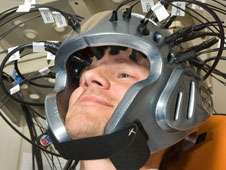Study Investigates Mental Overload in Pilots

Have you ever felt as if your brain was so full of information that you couldn't process another thing? Mental overload creates confusion and frustration, and for airline pilots, the consequences can be disastrous.
Researchers at NASA's Glenn Research Center in Cleveland are studying how advanced technology can be used to warn pilots when they are operating under dangerous levels of stress, fatigue and distraction. Biomedical engineer and lead researcher Angela Harrivel and research associate Terri McKay are testing the effectiveness of functional near infrared spectroscopy, also known as fNIRS. This emerging technology offers a non-invasive, safe, portable and inexpensive method for monitoring brain activity.
It uses infrared light to penetrate skin, brain and fluid to examine blood flow in the cortex and check the concentration of oxygen in the blood indicating neural activity.
"We ultimately want to use the technology to help pilots be more aware of their cognitive abilities during flight," says Harrivel. "No matter how much training they have, pilots could suffer from a lack of situational awareness when there is simply too much going on."
Pushing the limits
The scientists have fitted a kickboxing helmet with fNIRS optical sensors. In the study, Glenn volunteers don the helmet and sit in a moving cockpit simulator to give them a sensation of flying. The test subjects are presented with a variety of distractions and stress-inducing conditions as they use a joystick and flight instruments to stay "airborne" in virtual mode.
"Flying involves a lot of multitasking which can push the limits of human performance. During the simulation we purposely increase difficulty to add stress and confusion to see how they react and measure brain activity during overload," Harrivel explains.
Harrivel will redesign the headgear to make it more practical for everyday use if the research proves functional near infrared spectroscopy to be a reliable technology for monitoring pilot cognition.
Harrivel says the research also could reveal ways to simplify the delivery of information in the cockpits of commercial aircraft. Flight computers could be designed to detect dangerously high levels of distraction or stress and supply only the most critical data to the pilots until the situation is under control. The goal is to help pilots make better decisions to ensure the safety of their passengers.
One of the test subjects is Glenn employee Jim Withrow, himself a licensed pilot. "The ability to maintain situational awareness is critical, both in high stress areas and in periods when pilot demands are very low," Withrow said. "This research is reaching out to ensure that pilots get and keep their head in the game."
Most of the test subjects are not licensed pilots. Researchers enlisted both licensed and unlicensed pilots to participate in order to ensure a mix of participants -- those who were enthusiastic about the tests because of their flight experience, and those who had little or no flight experience but could demonstrate performance improvement over time.
The study is overseen by NASA's Integrated Intelligent Flight Deck Project, which is managed and funded by the Aviation Safety Program of NASA's Aeronautics Research Mission Directorate in Washington.
Source: Nancy Smith Kilkenny (SGT, Inc.), NASA's Glenn Research Center





















